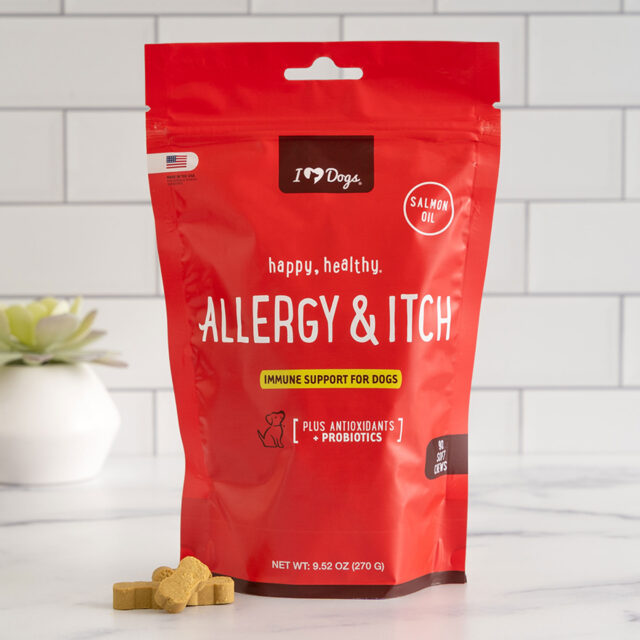
Watching your furry friend suffer due to itchy skin and inflammation is heartbreaking. Many health concerns can cause dogs to feel uncomfortable, so it’s essential to give them relief before the symptoms worsen. Luckily, apple cider vinegar for dogs may be the solution to your pup’s itchy skin, along with many other health concerns.
Apple cider vinegar might not have as many nutrients as other supplements, but it has been known to have a wide range of positive effects on canines. Is apple cider vinegar good for dogs, and what does it do for them? Let’s take a deeper look.

What is Apple Cider Vinegar?
Apple cider vinegar, also known as ACV, is a natural remedy for pets. It’s made by fermenting apples. Fermentation results in acetic acid, which is a compound of vinegar. It’s mixed with beneficial bacteria and yeast.
The process of making apple cider vinegar makes the probiotics and enzymes in apples more effective. Thus, it’s often used for benefitting humans and dogs. There aren’t a lot of studies to prove its benefits, but many people and pets have seen positive results after taking it.
Even though apple cider vinegar is newer for pet remedies, it has been helping humans for centuries. It was invented in 400 B.C., and Hippocrates used it to cure colds in ancient Greece.
Is Apple Cider Vinegar Good for Dogs?
Yes, apple cider vinegar is good for dogs. There are varying opinions on its effects, but dogs who have taken it have experienced positive results, such as a healthier coat, decreased allergy symptoms, and an improved gastrointestinal system. It has few side effects, making it a natural and safe alternative to allergy medications.
Of course, if you’re unsure about whether or not you should give your dog apple cider vinegar, consult your vet. They can give you the best advice based on your dog’s age, weight, and medical history.

What Does Apple Cider Vinegar Do for Dogs?
Apple cider vinegar does lots of incredible things for dogs, both internally and externally. So, here are some ways it could benefit your dog’s life.
Internal Uses of Apple Cider Vinegar
Most dog parents give this ingredient to their dogs orally. By eating treats and supplements with this item in them, dogs can experience a lot of health boosts inside their bodies. Many people even pour raw apple cider vinegar on their dog’s food. Here are some areas it could help with.
Deters Toxic Bacteria
Apple cider vinegar may have antimicrobial properties for dogs. It prevents dangerous bacteria from entering your dog’s body, such as E. coli or S. aureus. It can also help heal infections.
Improves Heart Health
The acetic acid found in apple cider vinegar can reduce high blood pressure and lipid levels, which will improve your pup’s heart health.
Prevents Bladder Infections
Research is still ongoing, but since apple cider vinegar is good for deterring harmful bacteria and healing infections, it’s often used for helping with urinary tract infections (UTIs) too. It can be found in cranberry treats, which can help heal bladder problems.

Reduces the Risk of Obesity
Oxidative stress in dogs can lead to obesity. This type of stress happens when free radicals damage cells inside your dog. Oxidation is supposed to occur in your dog’s body, but if the free radicals aren’t balanced, they can cause added stress that plays a role in canine obesity. Apple cider vinegar can help reduce that oxidative stress, which can lower the risk of diseases related to your pet’s weight.
Controls Blood Sugar
Apple cider vinegar isn’t a cure for diabetes, but it can help with controlling blood sugar. Giving your dog this ingredient for 8 to 12 weeks may help manage blood sugar, but there’s no scientific evidence to back it up.
Benefits Gut Health
Almost all of your dog’s immune system is in their gut. Their gut health plays a crucial role in their overall well-being. When apples are fermented, they make apple cider vinegar rich in prebiotics. Prebiotics help feed the probiotics in your dog’s gut, which improves their health.
Lowers the Risk of Cognitive Disorders
Apple cider vinegar contains phenolic compounds, such as gallic acid, catechin, and caffeic acid. Phenolic compounds can lower the risk of cognitive disorders in humans, which may have a similar effect on dogs. Giving your pooch apple cider vinegar could protect them from Canine Cognitive Dysfunction.
External Uses of Apple Cider Vinegar
Apple cider vinegar can help your dog internally in many ways, but it can also have external benefits. Here’s how applying this ingredient to your dog’s skin can make a difference.

Soothes Itchy Skin
Apple cider vinegar can soothe skin conditions whether you serve it orally or topically. It’s the benefit that most dog parents use it for. Serving apple cider vinegar with your dog’s food and water can heal their skin and give them the internal benefits mentioned above.
You can also apply this ingredient externally. Spraying it on the irritated spots or bathing your dog using apple cider vinegar are some methods for relieving dry, itchy skin. Before putting it on your dog, mix it with an equal amount of water to lower the concentration. Using apple cider vinegar alone could have too much acidity, which could make the problem worse.
Applying it directly to your dog is safe as long as you don’t put it on open wounds. The vinegar in it can sting if the wound hasn’t started healing. Rinsing your dog’s coat with an apple cider vinegar solution can keep them clean and remove odors. While curing itchiness, it may also improve your dog’s dandruff.
Cleans Ears
Dogs don’t need their ears cleaned regularly, but if their ears become itchy, irritated, or uncomfortable, you might need to step in. A way to cure inflamed ears is to use a solution made with half apple cider vinegar and half purified water. You can put the solution on a cotton ball and swab it in your pet’s ears.
The acetic acid in apple cider vinegar can remove harmful bacteria, making it excellent at fighting ear infections. If your dog is suffering from skin conditions, there’s a good chance their ears will get itchy too.
When cleaning your dog’s ears with apple cider vinegar, make sure you only clean the visible parts of the ear. Pouring the solution in your dog’s ear or swabbing with Q-tips can damage the ear canal. Delicately swab the outside areas only to avoid making the problem worse.
Repels Fleas and Ticks
Fleas and ticks are a risk to all dogs, regardless of their lifestyle. Your dog should take monthly preventatives, but you can also spray an apple cider vinegar solution on them for added safety. If they’re about to spend a lot of time outside, spray a solution that’s 50% water and 50% apple cider vinegar to repel pests.
The acidity in apple cider vinegar makes dogs less appealing to bugs that bite. However, if your dog is already infested with fleas, apple cider vinegar won’t cure them completely. In that case, you’ll want to discuss the best treatment options with your vet.

Cleans Stains and Odors
In addition to protecting your dog’s body, apple cider vinegar can also keep your home clean. Mixing apple cider vinegar with three times the amount of water will give you a solution that can eliminate pet stains and odors. You can spray it on carpeting and furniture to remove spots. It can also be sprayed on your pet’s beds and blankets to remove the stench. Overall, it’s a natural alternative to other pet odor products.
How Much Apple Cider Vinegar for Dogs is Safe?
The apple cider vinegar dosage for dogs can vary based on the type you use and your dog’s needs. There are many types of apple cider vinegar for dogs, including treats and liquid versions. So, if you’re unsure how much your dog needs, consult your vet for the best results. Here’s how much apple cider vinegar is safe for dogs, depending on what you’re using it for.
Apple Cider Vinegar Dosage for Exterior Use
For exterior use, it’s recommended that you always mix an equal amount of water or more with the apple cider vinegar. Then, you can gently spray that solution or apply it using a cotton ball. Focus on the irritated areas without going overboard. Some dog parents also add green tea to the mixture for more relief.
Never apply the apple cider vinegar solution to cuts, sores, or other open wounds. It could cause a burning sensation on your dog’s skin, making the irritation worse.
Apple Cider Vinegar Dosage for Oral Supplements
If you plan to give apple cider vinegar as a supplement, the dosage can vary. Liquid versions of apple cider vinegar should be mixed with food or water. If you’re unsure how your dog will react, start with a smaller amount and work your way up to the recommended dose.

Here’s the recommended dosage for apple cider vinegar supplements:
- Under 14 pounds – 1 teaspoon
- 15 to 34 pounds – 2 teaspoons
- 35 to 84 pounds – 1 tablespoon
- 85 pounds or more – consult your vet
Of course, these dosages are only suggestions. The best way to find an accurate dose for your dog’s age, weight, and medical history is to talk to your vet. They can help you decide if apple cider vinegar is right for your dog, and if so, how much is safe for them.
If you purchase a treat supplement that uses apple cider vinegar as an ingredient, the dose will be listed on the label. Even so, talking about the product with your vet first is always the safest option.
No matter how you give apple cider vinegar to your dog, it’s always a good idea to be cautious the first time. Keep an eye out for any reactions after their first dose. If any unusual behaviors occur, contact your vet right away.
Apple Cider Vinegar for Cleaning
For the most effective cleaning solution, you should mix a ratio of 1:3 for apple cider vinegar to water. Even when it’s watered down, apple cider vinegar can get rid of harmful bacteria. This natural cleaning solution can be used for spot cleaning stains or deodorizing smelly items.
Side Effects of Apple Cider Vinegar for Dogs
There will be risks and side effects for any products you choose for your dog. Yet, it’s essential to be aware of these concerns just in case. The most common for any product is allergies. Dogs with vinegar allergies may itch excessively or vomit as a result.
Another concern is that apple cider vinegar has high acidity levels, so it needs to be watered down or used with other ingredients. If used in a high concentration, it could worsen irritation. Excess acidity can lead to itchy skin, irritated eyes, and an upset stomach.

Dogs who have too low of a pH may be affected by apple cider vinegar’s acidity, even if it’s only a low concentration. If dogs have metabolic acidosis or similar conditions, their pH might be under 6, which is considered low. Most dogs have a pH of 7 or higher, but if you’re worried about your dog’s levels, you can ask your vet to test them for you. Urine test strips are another way for you to check.
While it’s not considered a side effect, it’s good to note that apple cider vinegar might not be appealing to all dogs. It has an unusual smell and taste, which is why it’s almost always served to dogs with other food, treats, and more appealing ingredients.
How to Serve Apple Cider Vinegar to Dogs
How you choose to serve apple cider vinegar to your dog depends on what you’re using it for. If they have itchy skin, you can apply a liquid solution on the outside or give them an oral supplement for relief. The exterior solution works best if you only want to repel pests or clean ears. However, if you’d like to combat several internal health concerns in addition to itchy skin, an oral variation will be the most effective.
If you’re choosing between raw and pasteurized apple cider vinegar, there are a few things to consider. Pasteurization removes many of the enzymes that cause health benefits for dogs. So, many dog parents recommend choosing raw apple cider vinegar with the “mother.” The mother is beneficial yeast and bacteria that form when the apples are fermented. If the “mother” builds up in the bottom of the container, shake the solution before giving it to your dog. It might look cloudy, but that’s how you know it has the nutrients your dog needs.
Finding forms of apple cider vinegar made for dogs is your best bet. Human-made products may contain ingredients that are harmful to dogs, such as xylitol. That’s why it’s important to look closely at what’s in a product before serving it to your pup.
Itchy Dogs Can Try This!
Since apple cider vinegar is often unappealing to dogs on its own, it’s easiest to serve it as a tasty treat. A chew can give your dog the same benefits as raw apple cider vinegar, but your dog will think it’s an enticing snack. Before purchasing an apple cider vinegar supplement, it’s important to choose a product from a reliable company specializing in beneficial ingredients.
For dogs who prefer chews over other supplements, the iHeartDogs Allergy & Itch Relief treats can help soothe their irritated skin. These chews include many beneficial ingredients, including colostrum, quercetin, reishi mushrooms, salmon oil, and apple cider vinegar.
Together, these ingredients can boost immune systems, improve digestive health, and promote healthy guts while providing itch relief. Your dog will feel better than ever without realizing their treats are healthy. Plus, every bag purchased gives 14 healthy meals to shelter dogs, so you’ll be making a difference for dogs in need.
No one wants to be itching nonstop. That’s why it’s essential to give your dog relief in the best way possible. Whether it’s applied internally or externally, apple cider vinegar can soothe your dog’s irritation, along with many other health benefits. It could be life-changing for your furry friend!
The post Apple Cider Vinegar For Dogs: Explore The Countless Health Benefits appeared first on iHeartDogs.com.
via Whisker Therapy
